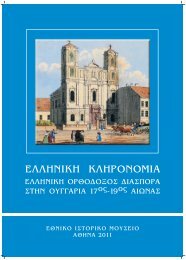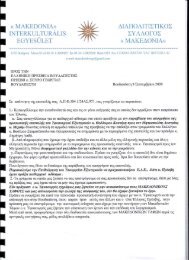Görög Örökség Ελληνική Κληρονομιά - H-ellin.com
Görög Örökség Ελληνική Κληρονομιά - H-ellin.com
Görög Örökség Ελληνική Κληρονομιά - H-ellin.com
You also want an ePaper? Increase the reach of your titles
YUMPU automatically turns print PDFs into web optimized ePapers that Google loves.
VLACHOI<br />
By Andreas Stamatopoulos<br />
Generally speaking, the word Vlachos means a stockbreeder, mountain-dw<strong>ellin</strong>g shepherd, villager.<br />
However, when we refer to somebody as "Vlachos" by origin, we mean the Latin-speaking citizen of<br />
the Roman State, who was speaking Latin and more precisely the bilingual Greeks from Thessalia,<br />
Epirus, Macedonia and diaspora. Consequently, the prevailing term in Greek is Vlachos<br />
(Aromanos), whereas in Vlachiki dialect it is Armanos.<br />
There are various roots that the word Vlachos derives from and they are as follows:<br />
1 - from the oldenslavic word "vlah" which means stranger, foreigner, latin-speaking.<br />
2- From the germán word "walechen" which also means stranger, latin-speaking<br />
3- From the Egyptian word "felah" (farmer) which refers to a person who is involved in<br />
cultivating the land.<br />
4- From the word "Volcae" of the Celtic tribe, which was adjacent to the germán tribes and that<br />
was the word used by the germans to refer to anyone who spoke latin.<br />
5- From the ancient-greek word "Vlichi", which proves that probably the words Vlachos-<br />
Vlacha are an advanced version of the ancient-greek Doric dialect.<br />
It lies beyond reason of doubt that the Greeks were using the word Vlachos 2500 years before.<br />
The Vlachoi who were breeding sheep are moving from south Greece to the north and take the term<br />
with them. Because the possibility of the very same word <strong>com</strong>ing from elsewhere is unsound.<br />
It is historically proven that the latin orientation of the nations occurred during the Roman<br />
Empire and from this point on begins the history of Vlachoi.<br />
It is known, via many studies, that the latin-speaking idiom of Vlachoi dates back on the 3 r<br />
century B.C.<br />
On the other hand, in Dakia- the older name of Romania the latin language spread 5<br />
centuries later, that is the 2" century A.D. Indeed the Romans are losing entirely their mother<br />
language, Dakiki, contrary to the Greeks who maintain their mother language as the main one and<br />
vlachika as a secondary language spoken by the family.<br />
The similarity between the two languages is due to the arrival of the latin-speaking people from the<br />
south to the north, the area of contemporary Romania, during the Byzantine and Ottoman Empires.<br />
In other words, the latin-speaking Greeks did not descend from but ascended to Dakia.<br />
After the occupation of Macedonia by the Romans in 167 B.C, the local Greek people are called to<br />
cover places in the public sector and protect the borders from the northern intruders. The Romans,<br />
who admire deeply the multi-powerful Macedonian army, recruit mercenaries so as to maintain<br />
order in the area and freedom of <strong>com</strong>munication on the streets and primarily on the mountain-paths.<br />
As a result, they implement the plan of having passguards in the road network of the Roman Empire.<br />
It is noticeable that all the premises of Vlachoi are located in the mountain-range of Pindos and<br />
Varnouta. Thus we conclude that the formation of the nation of Vlachoi derived from the street<br />
guards that the Romans placed in Pindos. As a result, the language of the Roman legionaries spreads<br />
from Wales and the Iberian penninsula to the Balkans and Egypt. These areas are attacked during<br />
the following centuries by the Slavs, Germans, Arabs and introduce new words into their languages.<br />
Thus we reach the formulation of contemporary languages such as Italian, Spanish, French,<br />
Portuguese, Swiss, Romanian and Aromaniki. The latin orientation of the Balkan populations lasts<br />
from 167 B.C. until 397 A.D, that is until the time of the separation between the East and<br />
143




